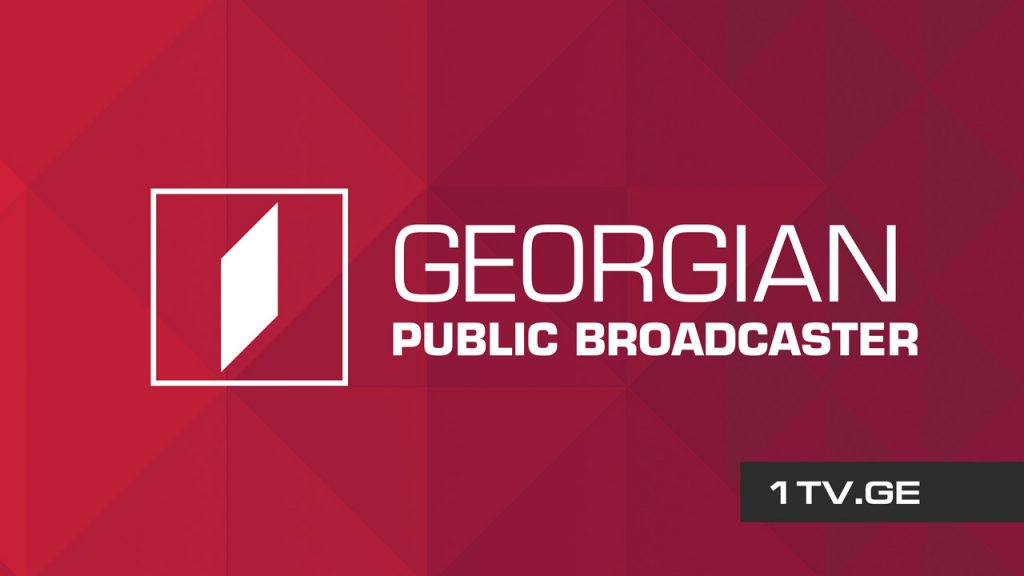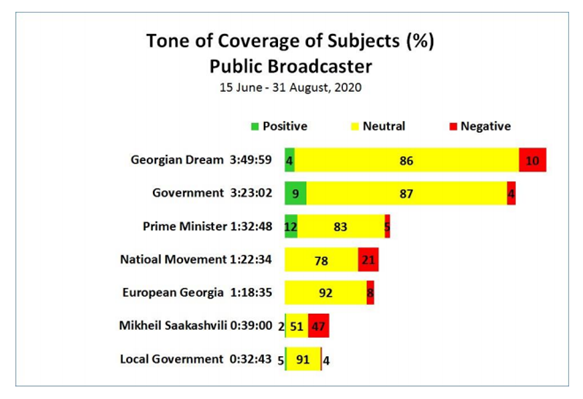
The Georgian Public Broadcaster (GPB) responds to the interim monitoring report prepared by the Georgian Charter of Journalistic Ethics
GPB believes that the presented conclusions are not the monitoring-based. Moreover, in some cases, they contradict it. Assessments in the report differ from the facts set out in the same document.
In connection with this, GPB applies to international organizations, and by expression of full trust to their impartiality and fair approach, hopes that they will have a relevant response.
On its part, GPB expresses full readiness for cooperation. The text of the appeal reads as follows:
The Georgian Public Broadcaster is responding to the interim monitoring report prepared by the Georgian Charter of Journalistic Ethics supported by EU and UNDP. Title page of the document says that only the Charter of Journalistic Ethics is responsible for the content of the report and that it cannot be perceived as the EU and UNDP position.
First of all, we confirm our trust in the international organizations’ activities in Georgia. However, in our view, the document reflects an unbalanced position of the party and it cannot be regarded as a report that carried out monitoring, and therefore, the conclusions are not the monitoring-based, so that in some cases, they contradict it. Assessments in the report differ from the facts set out in the same document.
According to the figure, in the quantitative part of the monitoring report, the First Channel coverage of the competing Parties was mostly neutral.
The quantitative data relevant to the coverage tone are followed by the record below in qualitative part: “During the monitoring, the information policy of the Public Broadcaster’s First Channel was loyal to the Government”.

What we learn from the report is that the First Channel information policy towards the Government was both neutral and loyal, which does not go together. Unfortunately, the contradiction is characteristic to the document: interpretation of neutrality as loyalty. A study, which aims at portraying both the qualitative and quantitative aspects, should not focus on just one, which is the case in the monitoring interim report prepared by the Charter of Journalistic Ethic. The documents states that in some cases the “Moambe” news program was biased and thus breached the ethical standards. However, the figure setting out the coverage of the “Georgian Dream” shows that in 86% of the cases First Channel coverage was neutral, 10% – negative and 4% – positive. It is noteworthy, that in the same paragraph, we see the accusation regarding breach of the ethical standards, as the fact of violation of ethical norms, in compliance with the requirements of the current legislation, has not been officially revealed.
The report also says that First Channel was especially loyal to PM Giorgi Gakharia. But, at the same time, we learn that it was only by 12% that His coverage was positive, while in the remaining 83% First Channel maintained neutrality.
The part of the report: “Gender Stereotypes on First Channel” is especially concerning. It describes nomination by the ruling “Georgian Dream” of Ms. Nino Latsabidze as a Parliamentary candidate for the town of Rustavi. The report cites the final phrase, which says: “And, finally, she is the mother of 4”. The report authors assess the phrase as strengthening the gender stereotypes and sexist. They say that the phrase emphasizes motherhood as a woman’s key duty.

We believe that description of the family status of the female and male Parliamentary candidates should be similar and a remark that a female candidate has children cannot be regarded as support to the gender stereotypes and sexism. Moreover, neglecting their social roles outside the career as is the case with the male candidates would be discriminative.
Complying with all the coverage standards, the Public Broadcaster is fighting against the gender stereotypes.
The monitoring applied to the First Channel main “Moambe at 21:00“ news program, the “New Week” and also, its web-site.
Concerning the social Media, the document says that “The key purpose of monitoring the TV channels’ Facebook sites is to determine how much the TV coverage differs from the information posted on their website”. The document makes it evident that the method and purpose of the monitoring carried out by the Charter of Journalistic Ethics are contradictory. By comparing incongruent products, it totally disregards the specifics of the selected platforms.
We want to make clear to the research organization that the Public Broadcaster has a clear-cut strategy of information distribution through social Media. Each program, including the ones on the social and political developments has its own site. We say emphatically that the monitored Facebook page is not that of the TV, so its selection in order to determine “how much TV broadcasting differs from the information spread by the social Media” is irrelevant. From the outset, the data subjected to the monitoring differed radically. Therefore, the conclusion that “the Facebook pages of the Georgian Media are even more polarized than their broadcasting” is wrong.
Besides, not only the video but texts are published on the monitored page. The research organization does not say anything about the methodology employed in the monitoring of the different material. We call on the Charter of Journalistic Ethic to publish detailed information on the methodology of measuring direct and indirect coverage and the tone applied to the totally different materials.
Also, it should be said that while speaking about the coverage balance of competing parties, the authors of the Charter’s interim report should have taken into consideration the fact that most of those were not active in the surveyed period (15 June – 31 August). The document says that “In the monitored period, the coverage of the restrictions relevant to COVID-19 pandemic and the Government allowances prevailed”.
Understandingly, the Public Broadcaster covered the hot issues and the parties’ involvement in them. The Charter’s survey describes the Public Broadcaster as loyal to the Government and by doing it discredit its principles and tarnishes its image.
To ensure a well-balanced pre-election broadcasting, support the information-based public choice and supply comprehensive information on First Channel programs to the interested parties, the Public Broadcaster is monitoring its platforms.
Georgian Public broadcaster considers it necessary to appeal to EU and the UN to pay more attention and ask the detailed information on the methodology and standards employed in the report, especially where the social media monitoring is concerned. We have to say that some of the members of the monitoring organization make no secret of their negative attitude to the Public Broadcaster, as an institution. Therefore, proving impartiality of its monitoring is very important. Otherwise, there could be a conflict of interests between the research organization and the researched, which in our view, is evident in the report.
Believing in the impartiality and fairness of the international organizations, the Public Broadcaster is hopeful about their relevant response. Georgian First channel is ready for collaboration.





